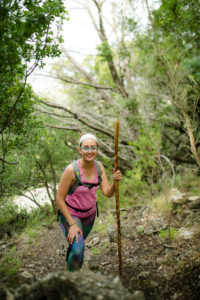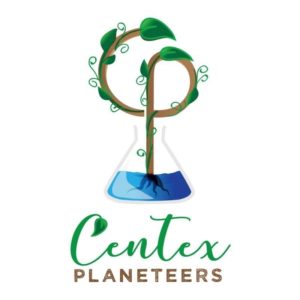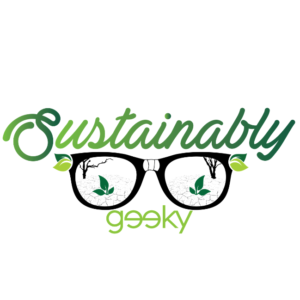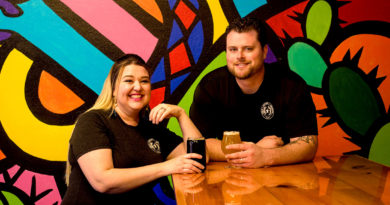Girl’s Guide to Saving the Planet
By Mandy Shelton | Photography by Justin Borja
Jennifer Hetzel is going to save the planet. To find out how, Tex Appeal joined her for lunch at Tyku Bistro in downtown Killeen. The following interview has been condensed to be environmentally sensitive by conserving paper.
 What sparked your interest in the environment?
What sparked your interest in the environment?
I’ve always had a sense of awe for the natural world. I love to hike and camp—it’s just so peaceful and calming—and the really cool thing about living here is we have so much outdoor recreation within a two-hour drive.
Tell us about forming the Centex Planeteers.
A friend and I started Centex Planeteers with the idea of exposing people to the environmental issues we’re facing in the world … and locally. These aren’t just things that are happening in books or movies; they’re happening in real life. That’s common ground you can find with people—we only have one planet. I started my podcast, Sustainably Geeky, to reach a wider audience and help people understand the issues facing our planet today.
How long have you been in Killeen?
I was born in D.C. We moved to Killeen from Georgia in 2000 when my dad was stationed at Fort Hood. Clearly, my life was over because we moved here when I was in the middle of high school and I had to leave all my friends. I was devastated. In my first year at Shoemaker High School, though, that changed. I was in band and got involved with other groups at school. That happened every time we moved. I would hate it initially, then I would get there and love it. I’d make friends and find my tribe.
What is your job title?
I am Director of Research at the Greater Killeen Chamber of Commerce. It’s an economic development role. We’re working to bring new industry to the area, promote Fort Hood and start a research park at A&M Central Texas, where we hope to attract green industries, like renewable energy. We’re also involved with the expansion of Interstate 14 and bringing broadband to Central Texas, but that’s the 20,000-foot view of my job.
What does it mean to be a Young Professional?
I’ve been a member of Greater Killeen Young Professionals since the group began back in 2008—I later joined the board and served as president. If you’re out there trying new things, learning and staying relevant and connected, I think you’re a young professional, no matter what your age. You have to be considerate of others and have more than just your own interests at heart. Helping others is a big part of any job, because people helped you get where you are. The way you treat people and how you act make you a professional.
Where were you educated?
I was a nontraditional student. I took a quick semester at the University of Texas in Austin right after high school. I intended to go back, but I started working full time. I promised myself I would finish, so I took classes at Central Texas College. I had two years under my belt when I quit my job—in the middle of a recession—and went back to school full time. Looking back, I think, “Wow, that was kind of stupid,” but it worked out, and I earned a four-year degree. When Texas A&M–Central Texas took over Tarleton State University in 2009, I got to help pick the colors and mascot and write the constitution for the student government association. Not many people get to do that.
Are you still involved with the convention formerly known as GeekFest?
In our 10th year, we changed the festival’s name to Epically Geeky Expo. This festival celebrates gaming, cosplay (dressing up like your favorite character) and the art of fandom. Participants make new friends and come away with lots of different ways to express and challenge themselves. EGX is a volunteer-run nonprofit benefitting CTC scholarships and educational programs. I’ve been on the planning committee—we call ourselves the Jedi Council—since the first festival in 2010. I stepped down this year, but I still promote and support it.
Get Involved
 Centex Planeteers
Centex Planeteers
This local environmental advocacy group promotes scientific literacy and environmental awareness. Hear local experts speak and take monthly field trips to visit events and businesses that promote environmental and science topics.
Meetings on the second Thursday of each month; 6-8pm, Fuddrucker’s, by the Killeen Mall ($5 donation requested, but not required)
Facebook.com/CenTexPlaneteers or
MeetUp.com/CenTex-Planeteers
 Jennifer’s Sustainably Geeky Podcast Discussions break down hard-to-understand environmental topics. Listen in on YouTube, Google Play, Stitcher, iTunes, Pandora and Spotify.
Jennifer’s Sustainably Geeky Podcast Discussions break down hard-to-understand environmental topics. Listen in on YouTube, Google Play, Stitcher, iTunes, Pandora and Spotify.
5 Ways to Be an Eco-Conscious Consumer
Reducing your carbon footprint can seem like a daunting task, but the key is to pick one or two activities at a time so you aren’t overwhelmed.
1. Less is more. Opt to purchase items with the least amount of packaging and avoid plastic whenever possible. The creation of plastic packaging releases greenhouse gases, which pollute the atmosphere; plastic packaging also leeches chemicals into our food and water, linking it to cancers and other illnesses. The plastic we throw away takes hundreds of years to break down, and often ends up in waterways, posing a danger to wildlife.
2. Ditch disposables. Say no to straws, single-use utensils and other disposables at restaurants or parties. Instead, bring your own reusable items made of glass, bamboo or metal. Keep a “Zero Waste Kit” in your car with a reusable straw, to-go container, utensils and cloth napkin.
3. BYOB: Bring your own bags. Reusable bags are everywhere these days—the key is remembering to bring them into the store with you. Don’t forget mesh or lightweight cotton bags for produce purchases.
4. Eat fresh and local. Incorporating organic seasonal fruits and veggies into your diet is not only good for your health, but good for your wallet, since seasonal food is generally the cheapest. Growing your own produce or shopping at farmer’s markets ensures the freshest produce and reduces your carbon footprint since the food didn’t have to travel far to get to you and was grown without pesticides.
5. Buy used. Purchase clothes and household items used when possible. This not only saves you money, it means less new resources were used to create the products you purchased. Plus, it extends the life of items that might otherwise end up in the landfill.




